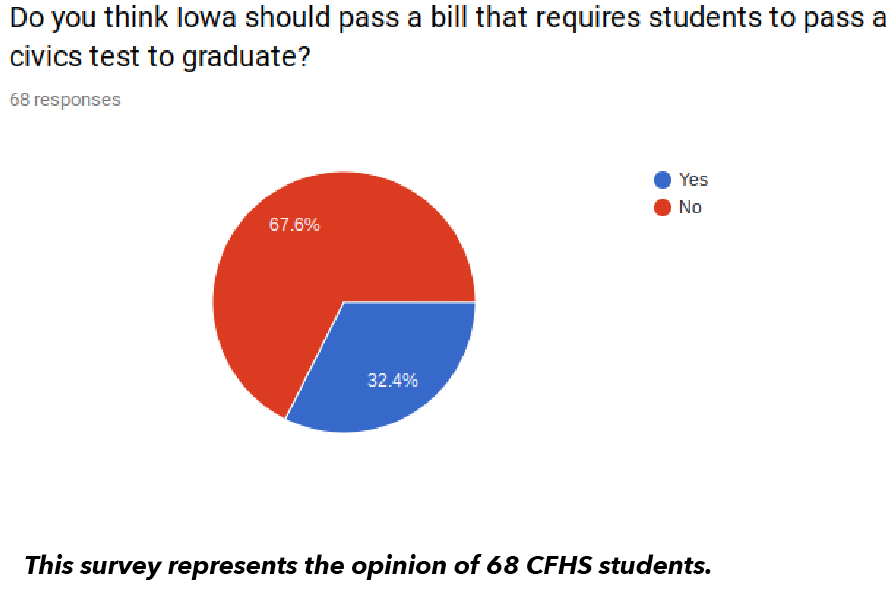Bill passed by senate requires students to pass civics test to graduate high school

Senate File 2341 was passed through the senate on Feb. 28, a bill that could potentially affect many Iowa high school students. The proposed law would require every student in Iowa to pass a civics examination to graduate from high school.
If the bill becomes law, students will take a 100 question exam from the most recent test administered by the United States Citizenship and Immigration Services. Once students enroll in the seventh grade, the test would be offered to them at no cost. The exam would be pass/ fail, and could be taken as many times as needed to pass. The exam would be limited to one attempt per school year.
Senator and sponsor of the bill Jerry Behn considers the exam as a way to make sure students are learning and retaining information about the government and the Constitution. He said, “Section of 256.115B of the code requires that high school students have a study of the constitution. This exam is a way to gauge if they’re learning what they’re actually supposed to be taught. In addition, it puts them on par with immigrants. The idea is that students should have knowledge of our nation’s government and political process.”
In addition to testing students, Behn also said it can teach students new information. “It will help individuals learn more about the government, about the constitution, so I see it as a win-win.”
Currently, to meet the 256.115B code, all Iowa schools are required to have students take a government class. If the information is retained, this class could double as preparation for the new civics exam.
A survey taken by 68 CFHS sophomores, juniors and seniors illustrates that half of them believe the knowledge gained from their government class and other classes at the high school is not enough for one to pass the test. At Cedar Falls, government is offered in the form of AP and regular level classes. Eight of the students noted the regular government class does not dive deep enough and provide enough knowledge for the exam. Both the AP and regular government class is a semester long, and many students felt that this is not enough time to soak up the information being taught.
Out of the 68 students that took the survey, 68 percent said they think Iowa should not require students to pass a civics test to graduate from high school.
Students noted that a multiple choice test in its nature does not always test their knowledge of civics. For instance, a question like “Name one war fought by the United States in the 1900s” cannot test a student’s true knowledge of government.
Senor Arlo Hettle said emphasizing the topics of voter registration and civics issues are more important than knowing basic facts about the Constitution. “I think that civic understanding and engagement is vital, but I think things like automatic voter registration and more discussions of civic issues and how they affect students would have more of a positive impact. I feel like this test would act more as a nuisance than as a way to engage students in thinking about their government,” he said.
Senior Clare Rolinger also said she values engaging students in politics and the knowledge that comes along with it, but she said she believes this exam could be an outlet for students to learn more.
“I think politics are something that is really important,” Rolinger said, “especially at this age. It is really important for us to start developing our opinions and thinking about legislation and different policies so that when we become 18 we can vote and have a voice in our country and society. I was reading an article last night, and there was a very large percent of people who couldn’t even name all three branches of government, which is really sad. I mean you have to develop your opinions. It’s your civic duty to have a voice in the government and act. I would hope it would do that.”
The goal of education is to deeply engage students in the knowledge. Hettle, who took a practice test offered by the Des Moines Register, does not believe this test could offer stimulating information. “The questions are so dry that I doubt they would cause anyone to suddenly become interested in government,” Hettle said.
The bill was approved 38-12 by Iowa senators and was sent to the House. If the bill is approved by the House, students should expect the bill to take effect for school years beginning July 1, 2019. However, a parallel House bill failed to move forward in earlier legislative hearings.










You must be logged in to post a comment Login